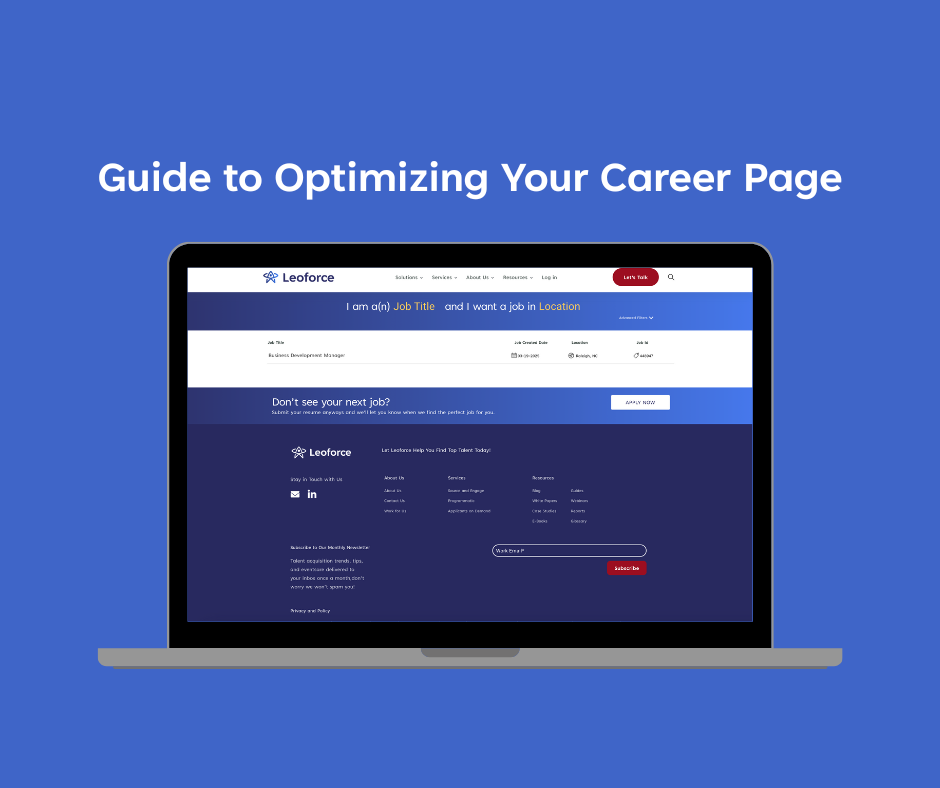Healthcare Recruiting Teams: Strategies for Dealing with Critical Nursing Shortages

Can you imagine building a house without first building a foundation? Well, just imagine a hospital without nurses. There’s no question the entire healthcare industry would likely collapse into itself without the support and dedication of skilled nursing professionals dispensing care and comfort to patients in need. That leaves healthcare recruiting teams facing quite the dilemma when it comes to addressing critical nursing shortages.
With the demand for nurses higher than ever, healthcare recruiting teams are tasked with the difficult job of finding the right talent for their organizations in a tight labor market where increasing competition for qualified nurses is fierce.
Fortunately, with the right strategies in place, finding and engaging these superheroes in scrubs is possible. But before we talk strategy, let’s explore how we got here, and why finding a few good nurses is the equivalent of finding a needle in a haystack.
Why There Are Nursing Shortages
The nursing profession has been evolving since the early 19th century when Florence Nightingale founded the first nursing school. Since its inception, nursing has become one of the most critical healthcare occupations out there. However, despite the significant role nurses play on a healthcare team, nursing shortages have become a major issue for healthcare recruitment teams. For a variety of reasons.
An aging population – As the population ages, the demand for healthcare services increases. With more individuals likely to develop chronic health conditions that require continuous medical care, the need for nurses is higher than ever. However, the supply of qualified nurses can’t keep up with the demand.
Baby Boomers are retiring – A large percentage of the current nursing workforce is composed of baby boomers who are retiring at an unprecedented rate. This retirement trend is causing an exodus of experienced nurses from the workforce, and the result is to a significant shortage of experienced nursing staff.
Healthcare is more complex now – The increasing complexity of healthcare has also played a significant role in nursing shortages. Technological advancements and new treatment procedures require more specialized nursing care, and nurses with more advanced training and skills. Unfortunately, there is also a shortage of these specialized nurses.
Wages don’t align with how hard nurses work – Lack of proper compensation is another contributing factor to nursing shortages. Many nurses feel underpaid and overworked, resulting in dissatisfaction, burnout, and low morale. Low pay makes nursing an unattractive profession for young people, resulting in a decline in the number of younger people choosing nursing as a career path.
The Impact of Nursing Shortages on Healthcare Recruitment
Nursing shortages have a profound impact on healthcare recruitment. The need for registered nurses (RNs) has always been high, but in recent years, the shortage has grown more critical. According to the American Nurses Association, there will be a need for an additional 1.1 million RNs by 2022[1].
The first impact of nursing shortages on healthcare recruitment is the obvious one. The challenge of finding qualified candidates for open positions. Healthcare occupations are in high demand, and nursing positions are no exception. However, with fewer nurses to choose from, recruiters face a challenge in filling open positions with qualified candidates. As a result, many organizations have been forced to increase their recruitment efforts, invest more time and resources into finding candidates, and offer higher salaries and benefits to attract talent.
Impacts to the Healthcare Industry and Society
The healthcare industry itself suffers as a result of nursing shortages as well. Not enough nurses means increased workloads for existing nurses, which can lead to burnout and fatigue. Nurses who are overworked and overstressed may leave their jobs, leading to a further shortage of qualified candidates. In some cases, organizations may even be forced to close down units or reduce the number of beds due to staffing shortages.
However, the impact of nursing shortages goes far beyond these challenges. The shortage also affects patient care, which in turn impacts society. With fewer nurses available to provide care, patients may have longer wait times, fewer options for care, and may lead to a decrease in the quality of healthcare. Nursing shortages can also have an economic impact on society. With fewer healthcare workers, the cost of healthcare may increase, as well as the burden on taxpayers.
It’s easy to see why having the right strategies in place for navigating nursing shortages is so important for healthcare recruiting teams.
Strategies for Dealing with Nursing Shortages
Here are some practical steps that healthcare recruiting teams can use to attract and retain nurses:
Diversify recruitment strategies: One of the most effective ways to overcome nursing shortages is to explore diverse recruitment strategies that target a broader range of potential candidates. Recruitment teams should consider non-traditional recruitment channels such as social media, nursing conferences, and online job fairs to reach out to nursing professionals.
Develop a strong employer brand: Building a strong employer brand is an essential step to attracting nurses and other healthcare professionals. Healthcare recruiters need to be able to showcase their organization’s culture, values, and employee benefits. Highlighting the company’s commitment to professional development, job stability, and work-life balance can significantly improve their appeal to prospective candidates.
Improve the candidate experience: Candidates often have several employment opportunities to choose from, which means healthcare recruiters need to be responsive and proactive in improving the overall candidate experience. This includes streamlining the recruitment process, providing regular feedback, and being available to answer candidate questions. It’s also where a powerful sourcing tool like Leoforce can be beneficial. With the ability to streamline talent engagement and communicate with candidates from a single interface with talk, text, email, and chatbot options, your ability to nurture nursing candidates throughout the recruiting lifecycle increases exponentially.
Offer competitive compensation and benefits: Offering competitive salaries and benefits is critical to attracting and retaining nurses. Recruiters should develop a robust compensation and benefits package that reflects industry standards and addresses the unique needs of nurses.
Implement retention programs: Once you’ve recruited talented nurses, it’s crucial to develop retention programs that foster loyalty and commitment to the organization. Creating a supportive work environment, and developing recognition programs can significantly increase employee satisfaction, which in turn reduces the risk of turnover.
Invest in the right AI sourcing technology: In recent years, technology has become an essential tool in healthcare recruitment. Investing in innovative technologies such as artificial intelligence, applicant tracking systems, and video interviews can significantly increase recruiting efficiency and streamline the onboarding process. It can also offer access to a broader pool of talent. With the Leoforce platform, healthcare recruiters get immediate access to a proprietary database of 850M+ local and global candidates, making it far more likely to find top nursing talent for your open roles.
But it’s not just about more candidates. It’s about finding the nursing candidates who are most likely to succeed in the job you’re sourcing. Ayra’s advanced search and match capability, and talent scoring and ranking allows healthcare recruiters to refine the parameters of their search and surface the most compatible candidates for 90% of jobs in under 5 minutes.
Resolving the nursing shortage is certainly not going to happen overnight. But by arming yourself with the right strategy and the right technological resources, you can certainly get a whole lot closer to reaching your healthcare recruiting goals. If you’d like to see the power of AI in action, book your demo of Leoforce today.
Resources
[1] https://mediakit.nurse.com/blog/nursing-shortage-recruiting/.





